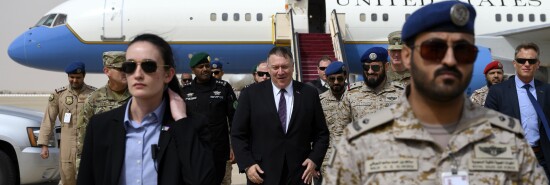
The Diplomatic Security Service is near breaking point
Tom Rogan
Part of the Department of State, the Diplomatic Security Service is a federal law enforcement agency responsible for various protective and investigative missions. Unfortunately, the DSS is near a breaking point.
The critical challenge is a growing and sustaining list of people that the DSS must protect. The agency has a standing mandate to protect non-head-of-state foreign dignitaries visiting the United States, the secretary of state, the U.S. ambassador to the U.N., and U.S. ambassadors assessed at high risk. Yet, facing an array of serious threats by Iran to assassinate various active and former U.S. officials, the DSS has been tasked with maintaining full-time protective details for those who would otherwise not have that security. Namely, former Secretary of State Mike Pompeo and former Iran special envoy Brian Hook. This is costing the government more than $2 million a month. Moreover, it is forcing the diversion of DSS agents away from investigative duties, such as countering passport fraud, and into time-consuming protective assignments.
The scale of the challenge facing the DSS is not widely understood in Congress.
IRANIAN ASSASSINATION PLOTS ARE ESCALATING. THE WEST MUST RESPOND
In part, that’s because the DSS lacks the political influence and name recognition of its far larger U.S. Secret Service protective partner. But lack of awareness of its overstretch is also a consequence of the DSS’s organizational culture. Consider that its agents are ultimately trained to be diplomats as well as federal law enforcement officers. This is a necessary part of their role serving as regional security officers, supervising the protection of U.S. embassies and diplomats around the world. Very few foreign governments share the heavily resourced U.S. approach to protective security, including top U.S. allies. In turn, to earn the cooperation of host governments in providing effective security for resident U.S. ambassadors and diplomats, or for visiting officials such as the secretary of state or assistant secretaries of state, DSS agents adopt a culture of politeness and making do with what they have, even when circumstances are extraordinarily challenging. Agents pride themselves on this.
The problem is that the DSS cannot sustain effective protection on its current track. Its agents are becoming too exhausted, risking workforce attrition and mistakes. Agents are human, after all, not inclined to relentlessly having to leave their spouses and families for short-term trips to stand post at domestic events or guard protectees on short jaunts around the world.
Fortunately, there’s a three-pronged solution to the problem.
First, the U.S. and its allies need to strengthen their deterrence of Iran’s assassination threats. Ayatollah Ali Khamenei and his IRGC minions must know that any detected assassination plot will result in punitive new sanctions. They must know that any successful attack will result in decisive military retaliation.
Second, the DSS needs more money. That’s needed to ensure that the agency’s other budgets are not ransacked to provide for overtime pay and travel costs. Most important of all, new funding is needed to build out the DSS recruitment and training pipeline. Defined by a blood feud mentality wrapped in a theologically motivated desire for vengeance, Iran’s threats to U.S. officials aren’t going away. They will likely exist for as long as the Islamic Republic exists, or until the point Iran successfully assassinates a high-ranking U.S. official. That reality means the U.S. must invest in hiring more agents now so that the DSS can relieve stresses on its organization in the years to come.
CLICK HERE TO READ MORE FROM THE WASHINGTON EXAMINER
Third, the Biden administration and the State Department should work with former U.S. officials to ensure that the DSS only provides protection while on U.S. soil or for foreign trips in support of U.S. foreign policy (such as attending a foreign counterpart’s funeral, for example). Unless there are concerns with regard to a specific foreign trip, former U.S. officials should request foreign government security or private security from organizers of a private event hosting them. This would provide a significant and immediate reduction in the strain on the DSS workforce.
The top line, however, is clear. The DSS needs relief. Failure to provide that relief risks catastrophic consequences.
